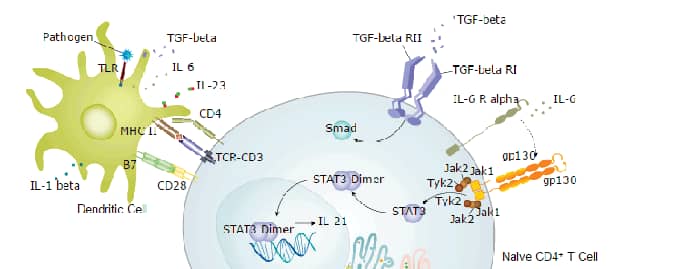Recombinant Human IL-21 Biotinylated Protein, CF Summary
- R&D Systems E. coli-derived Recombinant Human IL-21 Biotinylated Protein (BT8879)
- Quality control testing to verify active proteins with lot specific assays by in-house scientists
- All R&D Systems proteins are covered with a 100% guarantee
Product Specifications
Gln32-Ser162
Analysis
Product Datasheets
Carrier Free
CF stands for Carrier Free (CF). We typically add Bovine Serum Albumin (BSA) as a carrier protein to our recombinant proteins. Adding a carrier protein enhances protein stability, increases shelf-life, and allows the recombinant protein to be stored at a more dilute concentration. The carrier free version does not contain BSA.
In general, we advise purchasing the recombinant protein with BSA for use in cell or tissue culture, or as an ELISA standard. In contrast, the carrier free protein is recommended for applications, in which the presence of BSA could interfere.
BT8879
| Formulation | Lyophilized from a 0.2 μm filtered solution in PBS with Trehalose. |
| Reconstitution | Reconstitute at 250 μg/mL in PBS. |
| Shipping | The product is shipped at ambient temperature. Upon receipt, store it immediately at the temperature recommended below. |
| Stability & Storage: | Use a manual defrost freezer and avoid repeated freeze-thaw cycles.
|
Scientific Data
 View Larger
View Larger
Measured by its binding ability in a functional ELISA. When Recombinant Human IL-21R Fc Chimera Protein (991-R2) is immobilized at 0.500 μg/mL, 100 μL/well, Biotinylated Recombinant Human IL-21 Protein (Catalog # BT8879) binds with an ED50 of 1.50-9.00 ng/mL.
 View Larger
View Larger
2 μg/lane of Recombinant Human IL-21 Biotinylated Protein (Catalog # BT8879) was resolved with SDS-PAGE under reducing (R) and non-reducing (NR) conditions and visualized by Coomassie® Blue staining, showing bands at 15-20 kDa.
Reconstitution Calculator
Background: IL-21
IL-21 (Interleukin-21) is a potent cytokine regulating many cell types of the immune system. IL-21 is produced by activated T follicular helper cells (Tfh), Th17 cells, and NKT cells (2-6). Tfh-derived IL-21 plays an important role in the development of humoral immunity through its autocrine effects on the Tfh cell and paracrine effects on immunoglobulin affinity maturation, plasma cell differentiation, and B cell memory responses (4, 8, 9). IL-21 protein regulates several aspects of T cell function. It co-stimulates the activation, proliferation, and survival of CD8+ T cells and NKT cells and promotes Th17 cell polarization (3, 5, 6, 11, 12). IL-21 blocks the generation of regulatory T cells and their suppressive effects on CD4+ T cells (13, 14). In addition to its role in T cell biology, IL-21 also plays a critical role in B cell activation, proliferation, differentiation, and apoptosis (2). It is also required for the migration of dendritic cells to draining lymph nodes (10). And IL-21 suppresses cutaneous hypersensitivity reactions by limiting allergen-specific IgE production and mast cell degranulation (16). In the autoimmune disease Systemic lupus erythematosus (SLE), a link between IL-21 and SLE disease susceptibility and progression was recently reported (19). IL-21 protein exerts its biological effects through a heterodimeric receptor complex of gamma c and the IL-21-specific IL-21 R (2, 7). IL-21 is an approximately 14 kDa four-helix-bundle member of the family of cytokines that utilize the common gamma chain (gamma c) as a receptor subunit. gamma c is also a subunit of the receptors for IL-2, IL-4, IL-7, IL-9, and IL-15 (1). IL-21 R engagement enhances the cytolytic activity and IFN-gamma production of activated NK cells but limits the expansion of resting NK cells (15). Dysregulation of the IL-21/IL-21 R system contributes to the development of multiple immunological disorders (1, 17). The 133 amino acid (aa) mature human IL-21 protein shares 63% and 61% aa sequence identity with mouse and rat IL-21 protein, respectively. Alternative splicing generates an additional isoform with a substitution of the C-terminal 16 amino acids (18).
- Tangye, S.G. (2015) Curr. Opin. Immunol. 34:107.
- Parrish-Novak, et al. (2000) Nature 408:57.
- Coquet, J.M. et al. (2007) J. Immunol. 178:2827.
- Vogelzang, A. et al. (2008) Immunity 29:127.
- Korn, T. et al. (2007) Nature 448:484.
- Nurieva, R. et al. (2007) Nature 448:480.
- Asao, H. et al. (2001) J. Immunol. 167:1.
- Zotos, D. et al. (2010) J. Exp. Med. 207:365.
- Rankin, A.L. et al. (2011) J. Immunol. 186:667.
- Jin, H. et al. (2009) J. Clin. Invest. 119:47.
- Frohlich, A. et al. (2009) Science 324:1576.
- Yi, J.S. et al. (2009) Science 324:1572.
- Peluso, I. et al. (2007) J. Immunol. 178:732.
- Bucher, C. et al. (2009) Blood 114:5375.
- Kasaian, M.T. et al. (2002) Immunity 16:559.
- Tamagawa-Mineoka, R. et al. (2011) J. Invest. Dermatol. 131:1513.
- Ma, J. et al. (2011) Cytokine 56:133.
- Rahman, M. et al. (2007) FEBS Lett. 581:4001.
- Wang, et al. (2018) Nature Commun. 9: 1758.
FAQs
No product specific FAQs exist for this product, however you may
View all Proteins and Enzyme FAQsReviews for Recombinant Human IL-21 Biotinylated Protein, CF
There are currently no reviews for this product. Be the first to review Recombinant Human IL-21 Biotinylated Protein, CF and earn rewards!
Have you used Recombinant Human IL-21 Biotinylated Protein, CF?
Submit a review and receive an Amazon gift card.
$25/€18/£15/$25CAN/¥75 Yuan/¥2500 Yen for a review with an image
$10/€7/£6/$10 CAD/¥70 Yuan/¥1110 Yen for a review without an image




